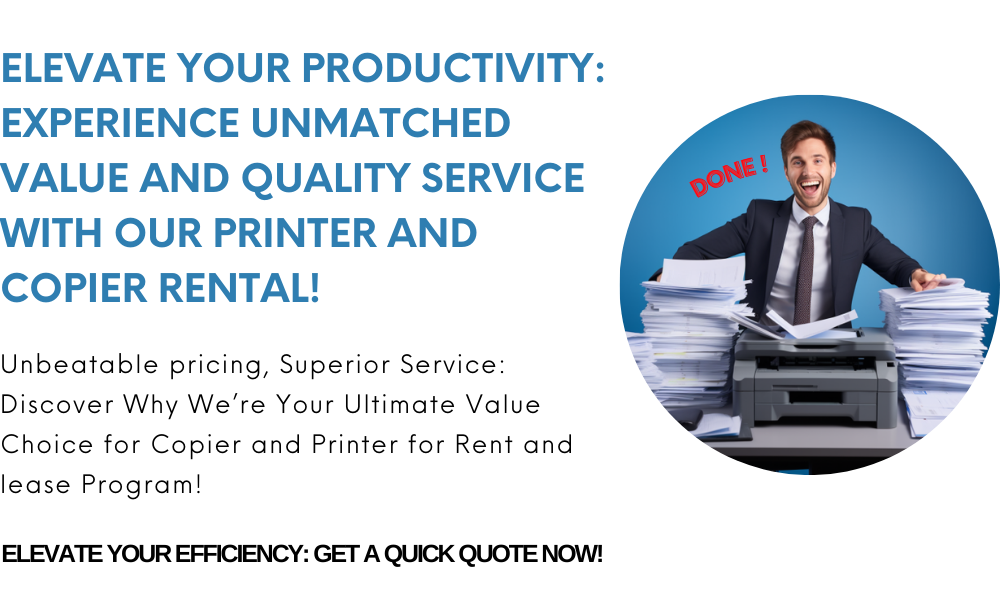
Copier Rental Philippines: Finding the Best Deals

Copier Rental Philippines: Finding the Best Deals
Your Complete Guide to Getting the Most Value for Your Business
In the modern office environment, having reliable printing and copying equipment is still essential—even in the digital age. Whether you’re running a small business, a school, a clinic, or a large enterprise, efficient document management directly affects your productivity. For many organizations, renting a copier is a smarter, more cost-effective alternative to buying one outright. But with so many options available, how do you find the best deal?
This guide to Copier Rental Philippines: Finding the Best Deals will walk you through what to look for, how to compare offers, and how current industry trends can help you make an informed choice.
Why Copier Rental Makes Sense in the Philippines
Purchasing a copier can cost anywhere from ₱40,000 to over ₱300,000 depending on the features, size, and brand. On top of that, you need to budget for maintenance, toner, repairs, and possible machine replacement in a few years. For most businesses, especially SMEs, this isn’t the most practical choice.
With copier rental:
You avoid large upfront costs
You get access to modern machines with updated technology
Maintenance is usually included in the rental package
You can upgrade easily as your business grows
Whether you need basic black-and-white printing or high-volume color output, renting gives you flexibility without the financial strain.
What to Look for in a Copier Rental Deal
When evaluating deals for Copier Rental Philippines: Finding the Best Deals, consider more than just the price. Here are some critical factors to weigh:
1. Machine Specifications
Choose a copier that fits your actual needs. Ask:
Do you need color or black-and-white printing?
How many pages do you print monthly?
Do you require scanning, faxing, or cloud integration?
Do you want duplex (double-sided) printing?
If you choose a machine that’s too basic, your workflow will suffer. If it’s too advanced, you’ll pay for features you don’t use.
🡆 Read: Technological Advancements in Copiers
2. Rental Terms and Contract Flexibility
Look for rental terms that match your business cycle. Some providers offer:
Monthly, quarterly, or annual contracts
Option to upgrade or downgrade
Trial periods for testing
No lock-in period for SMEs
Flexible agreements allow you to scale your operations without getting stuck with outdated machines.
3. Inclusions in the Rental Package
Ask for a clear breakdown of what the rental covers. Good deals usually include:
Regular maintenance and servicing
Replacement of toner and parts
On-site repairs or technical support
Usage tracking and reporting
Transparent pricing helps you avoid surprise charges later.
🡆 Understand the Regulatory Impact on Copier Rentals
4. Provider Reputation and Support Quality
Working with a reliable rental provider can save you headaches. Look for companies that:
Have positive client reviews
Offer responsive customer service
Provide service-level agreements (SLAs)
Have branches or technicians near your location
Fast response and dependable support can minimize downtime and keep your office running smoothly.
Industry Trends That Can Help You Choose Wisely
The copier rental market in the Philippines is changing. Being aware of current trends can help you get better deals and smarter features.
1. Digital Transformation is Driving Demand
As companies shift to hybrid work models and paperless systems, copier machines now integrate with cloud storage, mobile devices, and workflow apps.
🡆 Explore the Impact of Digital Transformation
Look for rentals that offer:
Scan-to-email or scan-to-cloud options
Mobile printing via apps
Data security features like PIN release or encryption
2. Consumer Preferences Are Evolving
Modern users want speed, ease of use, and convenience. Older copier models may be slow, noisy, and difficult to maintain.
Choose rental providers that offer:
Touchscreen interfaces
Quiet, energy-efficient models
Fast warm-up and printing speeds
🡆 See Shifts in Consumer Preferences
3. Eco-Friendly and Cost-Efficient Machines Are In Demand
Many businesses are now looking for machines that save energy and reduce paper waste. You can ask for copiers that:
Automatically print double-sided
Enter sleep mode when not in use
Use toner-saving modes
Offer print quotas per user
These features not only reduce environmental impact—they also lower your monthly operating costs.
Comparing Copier Rental Packages in the Philippines
When comparing offers, create a shortlist of providers. Then compare based on:
| Feature | Provider A | Provider B | Provider C |
|---|---|---|---|
| Monthly Cost | ₱___ | ₱___ | ₱___ |
| Machine Type | Black & White | Color | Multifunction |
| Free Maintenance | ✅ / ❌ | ✅ / ❌ | ✅ / ❌ |
| Support Response Time | ___ hours | ___ hours | ___ hours |
| Upgrade Options | ✅ / ❌ | ✅ / ❌ | ✅ / ❌ |
| Included Supplies | Toner Only / All | Toner Only / All | Toner Only / All |
Choose the one that meets your performance needs and provides long-term value.
🡆 Get Insights from Copier Rental Market Trends
How to Negotiate a Better Copier Rental Deal
If you’re ready to rent, don’t settle for the first offer. Try these tips:
Ask for a demo before signing the contract
Negotiate the rental rate—especially if you’re renting for multiple branches
Bundle services (e.g., multiple machines or service with supplies) for discounts
Request for flexible terms, such as trial periods or early exit clauses
Compare reviews from other businesses in your industry
Most providers will be open to negotiation—especially if you’re planning a long-term contract or multiple-unit rental.
Final Thoughts: Smarter Printing Starts with the Right Rental
Copier Rental Philippines: Finding the Best Deals is more than a cost-saving effort—it’s a strategic move to boost efficiency, reduce waste, and improve document handling in your business.
Whether you’re running a law firm, school, real estate office, or government agency, the right copier rental can streamline your operations and help your team do more with less.
By staying informed about the latest trends and asking the right questions, you can confidently choose a copier rental provider that delivers not just a machine—but value.
Outbound Links Recap:
Start Renting Today
Printer rentals provide a practical, flexible, and budget-friendly solution for businesses of all sizes. Whether you’re comparing printer rentals vs. purchasing, searching for eco-friendly options, or exploring solutions for high-performance printers, we have the right plan for you.
For more answers to common questions, visit our printer rental FAQs. Explore our customizable printer rental contracts and find the perfect fit for your business needs today. Let us help you enhance efficiency and flexibility with a rental plan designed for success.
To learn more about printer rentals and how Marga Enterprises can support your green initiatives, contact us today at 09171642540 or 09614481276. You can also reach us via email at marga.enterprises2013@gmail.com. Let’s work together to build a greener, more sustainable future for generations to come. Visit Marga Enterprises and find out why we are the No. 1 Copier & Printer Rental Provider in the Philippines.
Join our growing community on Facebook and Youtube for exclusive content and discussions designed to propel your business forward. Stay updated on our posts and be part of the conversation!